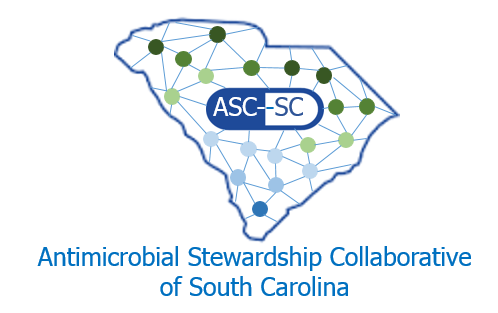DHEC To Observe World Antibiotic Awareness Week November 13-19, 2017
FOR IMMEDIATE RELEASE
November 9, 2017
DHEC To Observe World Antibiotic Awareness Week November 13-19, 2017
COLUMBIA, S.C. - World Antibiotic Awareness Week will take place Nov. 13-19, 2017. This event is to promote awareness of the urgent public health threat from the increase in microorganisms that are resistant to antibiotics. World Antibiotic Awareness week will be marked by the engagement of the public, policy makers, health professionals, and students through social media and local events to raise awareness and understanding of this problem worldwide. The goal is to spark change so that antibiotics are used only when necessary.

The South Carolina Department of Health and Environmental Control (DHEC), in partnership with the University of South Carolina School of Medicine and College of Pharmacy, has established a statewide Antimicrobial Stewardship Collaborative of South Carolina (ASC-SC) to reduce the threat of antimicrobial-resistant organisms in South Carolina. Antibiotic stewardship means using the right drug at the right dose for the right amount of time.
Antibiotics are treatments for bacterial, not viral infections, and worldwide bacteria are becoming resistant to antibiotics used to treat both common and life-threatening infections. Infections due to antibiotic resistant organisms used to be a more significant problem in hospital settings but they are now increasing in long-term care settings, like nursing homes, and in community-acquired infections. The increase in antibiotic resistance is resulting in longer illnesses, and more deaths. Unfortunately, new antibiotics are not easily developed and treatment options are decreasing. Each year, in the United States alone, two million people become infected with resistant bacteria, and 23,000 people die because of these infections.
According to The Centers for Disease Control and Prevention (CDC), up to 50% of antibiotics given for human illnesses are for an incorrect dosage or duration. Many antibiotics are given when patients expect a prescribed antibiotic for illnesses like the common cold or other minor upper respiratory infections that antibiotics are not helpful for. The unnecessary use of antibiotics contributes to the development of resistant bacteria and these bacteria can be passed from one person to another causing infections that are more difficult to treat. The use of antibiotics in food-producing animals to promote growth, not treat infections, also contributes to antibiotic resistance.
ASC-SC is working with healthcare providers across the state to promote antibiotic stewardship and reduce antibiotic resistance. ASC-SC has organized regional meetings across the state to engage clinicians, infection preventionists, pharmacists, and laboratory technologists and then brought experts in these fields to a statewide meeting to share effective practices for the use of antibiotics and to do surveillance to detect resistant bacteria. The work of ASC-SC In the coming year will include studying antibiotic prescribing practices in South Carolina to find ways to reduce unnecessary antibiotic prescriptions, developing a profile of patterns of antibiotic resistant organisms, and helping healthcare facilities adopt CDC recommended antibiotic stewardship activities.
For more information on World Antibiotic Awareness Week and the urgency of the problem, please visit: http://www.who.int/campaigns/world-antibiotic-awareness-week/en/
For more information regarding South Carolina's efforts to combat antimicrobial resistance, please write to: ASC-SC@dhec.sc.gov or visit DHEC's website.
DHEC Media Relations
media@dhec.sc.gov
(803) 898-7769